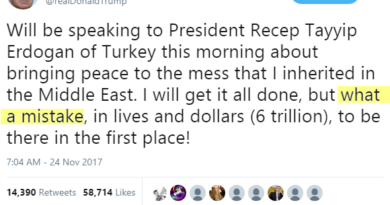Extensive Human Rights Violations During Turkey’s 18-month State of Emergency Says UN Report
UN OHCHR Report on the State of Emergency and Human Rights in Turkey
According to a report issued by the UN Office of the High Commissioner on Human Rights (OHCHR) on Tuesday, the ongoing state of emergency in Turkey has led to extensive human rights violations against hundreds of thousands of people in the form of arbitrary deprivation of the right to work and the freedom of movement, torture and other ill-treatment, arbitrary detention and infringements of the rights to freedom of association and expression. The report (linked below) covers the entire calendar year of 2017.
the sheer number, frequency and lack of connection of several [emergency] decrees to any national threat seem to…point to the use of emergency powers to stifle any form of criticism or dissent vis-à-vis the Government.
The state of emergency was first imposed by the Turkish government for a three-month period in the wake of the failed coup attempt against President Recep Tayyip Erdogan on July 15, 2016. The state of emergency has been re-authorized five times since then, under the auspices of “combating terrorism”. However, the UN report says, “the sheer number, frequency and lack of connection of several [emergency] decrees to any national threat seem to…point to the use of emergency powers to stifle any form of criticism or dissent vis-à-vis the Government.”
Firings and Arrests and the Chilling Effect
The report goes on to say that several decrees regulate various matters unrelated to the state of emergency, for instance the closure of civil society organizations and medical centers, “which seems to indicate that they are being used to limit various legitimate activities”. At least 152,000 civil servants have been dismissed since the failed coup, 4,200 of which were judges and prosecutors. Some civil servants have even been arrested.
Some 159,506 people have been taken into custody since the failed coup. Out of those, some 55,000 were
eventually arrested. 1,480 lawyers faced prosecution of some form, 570 have been arrested, and 79 were sentenced to long-term imprisonment. The report also notes a “a pattern of persecution of lawyers representing individuals accused of terrorism.”
Approximately 300 journalists have been arrested and detained on the grounds that their publications contained apologist sentiments regarding terrorism or other “verbal act offences”, or for “membership” in terrorist organizations. Through emergency decrees, the Turkish government also liquidated 166 media outlets and confiscated all of their assets. Over 100,000 websites were also reportedly blocked in 2017.
According to the report, the Turkish government also permanently closed 1,719 organizations in the form of human rights, humanitarian, lawyers’ associations, foundations, and NGOs. The report states that OHCHR received numerous accounts of self-censorship by many in the media and human rights NGOs due to the climate of fear and judicial harrassment.
Detention and Torture
Based on the accounts collected by OHCHR, the acts of torture and ill-treatment generally appeared to aim at extracting confessions or forcing detainees to denounce other individuals. It was also reported that many of the detainees retracted forced confessions during subsequent court appearances. OHCHR found that perpetrators of ill-treatment and torture included members of the police, military police and security forces. The number of investigations reportedly carried out into allegations of torture was “grossly disproportionate to the alleged frequency of violations”.
OHCHR estimates that approximately 600 women with young children were being held in detention in Turkey as of December 2017. In almost all cases, the women were arrested as “associates” of their husbands, who were the Government’s primary suspects for connection to terrorist organizations, without separate evidence supporting charges against the women themselves. OHCHR also documented the use of different forms of torture and ill-treatment in custody, including severe beatings, threats of sexual assault and actual sexual assault, electric shocks and waterboarding.
Concentration of Power
The report cites the April 2017 referendum that extended President Erdogan’s executive powers into both the legislature and the judiciary as seriously problematic. The report asserts that this has resulted in interference with the work of the judiciary and curtailment of parliamentary oversight over the executive branch. “[T]the sheer number, frequency and lack of connection of several [emergency] decrees to any national threat seem to…point to the use of emergency powers to stifle any form of criticism or dissent vis-à-vis the Government.”
Twenty-two emergency decrees were promulgated by the end of 2017, with two more since the cut-off date of the report. Many of the decrees regulate matters unrelated to the state of emergency and limit various legitimate activities by civil society actors, the report said.
Share, comment, like, follow
Resource Links:




